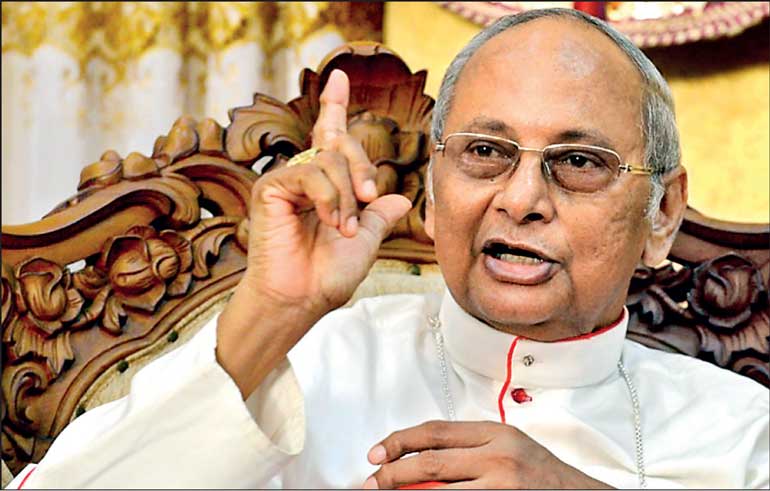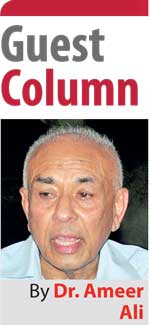Tuesday Feb 17, 2026
Tuesday Feb 17, 2026
Saturday, 25 September 2021 00:10 - - {{hitsCtrl.values.hits}}

Archbishop Malcolm Cardinal Ranjith has first-hand knowledge of what is in the 22-volume report on the Easter attacks, what the commission’s recommendations were and what actions had been taken so far by the President. He obviously feels that there is a mastermind that engineered the whole episode and is being protected by the authorities
There is no kingdom without an army; there is no army without wealth; there is no wealth without prosperity; and there is no prosperity without justice – Ibn al-Balkhi (850-934)
 It is nearly two years and six months since the Easter massacre was executed by a bunch of Muslim lunatics led by a madrasa dropout and brainwashed by ISIS and Al-Qaida, Zahran Hashim. That infamy killed nearly 250 innocent Christian worshippers and destroyed three churches and a hotel.
It is nearly two years and six months since the Easter massacre was executed by a bunch of Muslim lunatics led by a madrasa dropout and brainwashed by ISIS and Al-Qaida, Zahran Hashim. That infamy killed nearly 250 innocent Christian worshippers and destroyed three churches and a hotel.
All those who were directly involved in that killing were hunted down and killed by the security, and the Muslim community justifiably refused to perform the final religious rites that are otherwise accorded to any dead Muslim.
After that, two commissions were appointed to investigate the massacre, one by the Yahapalana regime and the other by the current President Gotabaya Rajapaksa. The second commission submitted its 22 volumes report to the President, and he appointed another kitchen cabinet to summarise that report, pick and recommend items for action.
After public outcry a copy of that report was also handed over to the Colombo Archbishop Malcolm Cardinal Ranjith. It is therefore clear that the Cardinal has first-hand knowledge of what is in that report, what the commission’s recommendations were and what actions had been taken so far by the President. He obviously feels that there is a mastermind that engineered the whole episode and is being protected by the authorities.
Perhaps, it was to clear the air that Minister of Public Security Sarath Weerasekera announced a few weeks ago that Noufer Moulavi, who is under custody, was the mastermind; but that was neither endorsed nor denied by the President or the Prime Minister, or by anyone else from the Government.
In the meantime, and by way of action, dozens of Muslims have been arrested on various charges relating to the massacre and they are languishing in prisons without being brought to trial. Among them are Noufer Moulavi and Hajjul Akbar, two preachers of Islam; Hejaaz Hizbullah, a human rights lawyer; Ahnaf Jazeem, a young poet; Azath Sally, a former Provincial Governor; and Rishard Bathiudeen, a current Member of Parliament. In addition, the Government has also proscribed several Muslim organisations on the ground that they were advocating fundamentalist and extremist ideas without specifying what those ideas were. At the same time, Bodu Bala Sena, an Islamophobic and Buddhist supremacist organisation that was found actively behind a number of anti-Muslim disturbances, and therefore was recommended by the Presidential Commission of Investigation (PCoI) to be banned, is allowed to operate freely.
Above all, crimes committed in the immediate aftermath of that bloody Easter, by thugs and hooligans against Muslim families, their businesses and properties, all happened while security officers looked the other way, were never investigated and culprits never faced the law. Even those who were arrested got released afterwards on the recommendation of politicians. In short, an entire community is made to account for a crime committed by a few. Is this justice?
This is why just as the Catholic community is seeking justice, so also is the Muslim community. The only difference between the two is, while the former has a strong and committed leader in the person of a Cardinal, who is refusing to give up his agitation and prepared to go even before the world court if domestic authorities fail to deliver justice, the latter has a bunch of political and religious leaders many of whom are nincompoops afraid to challenge the authorities for fear of reprisals that would damage their own positions and privileges.
It is their opportunistic politics that cost their own community as well as the nation as a whole so much after 2019. The whole country is suffering today because of what some of them did when the 20th Amendment to the Constitution came for voting before Parliament.
There is no doubt that Zahran and his murderers had the motive to do what they did. Certain developments from within the community, which were discussed sometime back in Colombo Telegraph (see ‘Anatomy of an Infamy II & III’) and from outside, created a mindset among many Muslims that promoted an attitude of self-othering in a plural society. It happened in certain other countries also where Muslims are a minority. When some of these self-othered young and middle-aged individuals fell prey to the jihadist propaganda of ISIS, Al-Qaeda and their ilk, thanks to modern communication technology and social media, they were prepared to sacrifice their life for the sake of reconstructing the dead Islamic state.
However, and this is crucial, in the case of Sri Lanka, none of the Zahran clique had the mental capacity and strategic technique to organise and coordinate an attack of such complexity without the guidance and coordination of a mastermind. It is the regime’s attempt to cover up and protect that mastermind that appears to have irked the Cardinal and made him therefore call openly for the full implementation of PCoI recommendations, including the identification of the chief architect. As mentioned earlier, he has first-hand knowledge of the contents of the report.
More than the Christian and Muslim communities however, it is the Buddhist community that needs to know the unadulterated truth about this horrible episode. Because, that community almost since the country’s independence has been taken for a ride by various groups of power seekers who want to win their own political battles.
The Buddhist community, best known for its compassion and toleration, has been constantly indoctrinated by these elements and made it to believe that Buddhism and Buddhists are under threat from minorities, be they ethnic or religious. This a political industry allowed to flourish in this country, and it has destroyed not only the nation’s millennial communal peace but also its economic prosperity and international image.
When the Cardinal’s outspokenness started unsettling the agenda of these elements their aficionados came out in defence of their masters. BBS Secretary, the saffron-robed Gnanasara for example, rushed to remind the Cardinal that he should not be too hasty and that it would take time for authorities to find out who the mastermind was. This means Minister Weerasekera was telling a lie when he announced previously that Noufer Moulavi was the mastermind. The same Secretary has also warned the Government that there is a security threat from Muslim fundamentalists and that he has evidence to prove it. How does anyone make sense out of this developing drama?
The country is facing crises on multiple fronts. People’s life, national economy, children’s education, foreign relations and the environment are all in a state of dereliction. Gross mismanagement by the State is at the bottom of this calamity. This has created public anger which led to widespread street marches and protests in the middle of the pandemic.
The belated lockdown and a surreptitiously-declared emergency have halted these protests for the moment. But when the country opens for business, they are bound to re-emerge. The regime therefore needs an enemy to divert the attention of its supporters. The Muslim community fits the cap. Unfortunately, this community does not have an effective leadership to fight for its interests.
At least the identity of the mastermind would help free the community from manufactured blames and malicious aspersions. Archbishop Malcolm Ranjith is bravely agitating for it. The only alternative for Muslims, therefore, is to rally behind this agitator. Will Muslim intelligentsia and civil societies make the first move?
(The writer is attached to the School of Business & Governance, Murdoch University, Western Australia.)